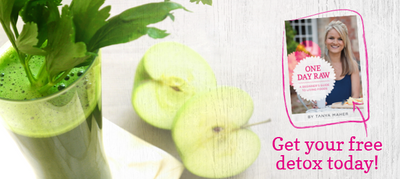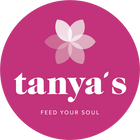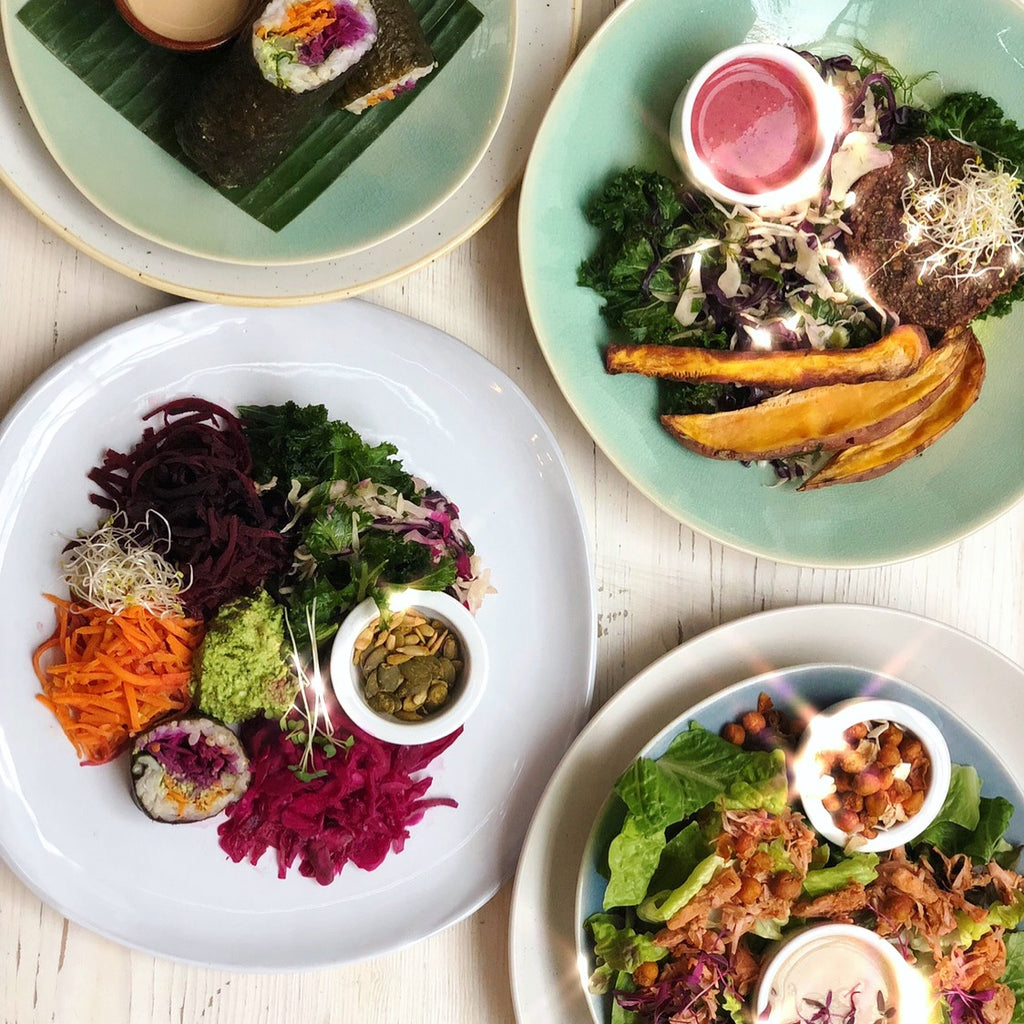BABY WITH COLIC: WHAT TO DO, EAT AND AVOID
Almost to the day of baby Banks turning 5 weeks, he started waking up from 4 or 5am in mega discomfort, upset, tense, fist-clenching-back-arching-stiff and colicky.
It was always at the same time and always for a minimum of an hour till I massage, rub, tap, bounce, sing, feed, cuddle, skin-to-skin, rock, ride and sway all the techniques Google had to offer.
Then throughout the day, I’d busy myself searching and eliminating food groups to see what makes a difference the following night.
Four weeks later (the boy is now 9 weeks), we seem to have the worst of this painful stage behind us, but only if I stick to the below protocol. The day I sneak in a little ‘no no’ food will follow by the night we both pay for it.
Here’s everything I learned over this time…

COLIC & WIND: GOOD TO KNOW
- It’s not uncommon for babies to be uncomfortable in the early hours of the morning. Their digestive system does not always develop at the same rate as their appetite and gets “overloaded”. -Gina Ford
- The reason for fussing and fretting is that the stools of a very young baby are so soft, they do not put enough pressure on the anus, making them more difficult to eliminate. It is something he will grow out of as his systems mature. Once he’s taking solid foods, things may well improve. -Dr Spock
- Gripe is caused by muscle spasms and excess acid created when air bubbles form in baby's tummy. When the air bubbles get trapped in baby's stomach, the stomach thinks it is full of food, so acids are produced which would normally break down the food particles. These acids are not needed and can cause irritation. At the same time, because the stomach is full of air bubbles its muscles are unable to relax causing cramps and spasms. -Woodward’s
- No one completely understands colic. What we do know is that the pain is in the gut and that the whole baby is upset as a result. (The term ‘colic’ comes from the Greek ‘kolikos’, meaning ‘suffering in the colon’). - Dr Bill via AskDrSears
- Colic will eventually run its course and most infants grow out of it between six and 12 weeks of age. Meanwhile everything you eat is transmitted through breastmilk and “maternal intake of food allergens is an important factor in the [development] of infantile colic among breastfed infants”. - Study in Nov 2005 issue of Pediatrics
- The “Rule of Threes” is used to define colic: A colicky baby has incessant, inconsolable crying for at least 3 hours per day on at least 3 days per week, for more than 3 weeks. Crying is usually the worst in the evening hours. A baby with colic vs just gas doesn't always mean the same thing, however what works for colicky babies may also help babies with milder types of GI discomfort. -Alice Callahan, PhD
- It takes 12-16 hours after you have eaten something to cause a bout of windy crying in a baby if they are being affected by it.
- Young babies only cry for 5 reasons: hungry, full of wind, overtired, nappy needs changing, too cold/hot. If you have covered all of the above, then your baby may have a different problem, maybe a pain brought on by food intolerance. See a doctor then. - Tizzie Hall
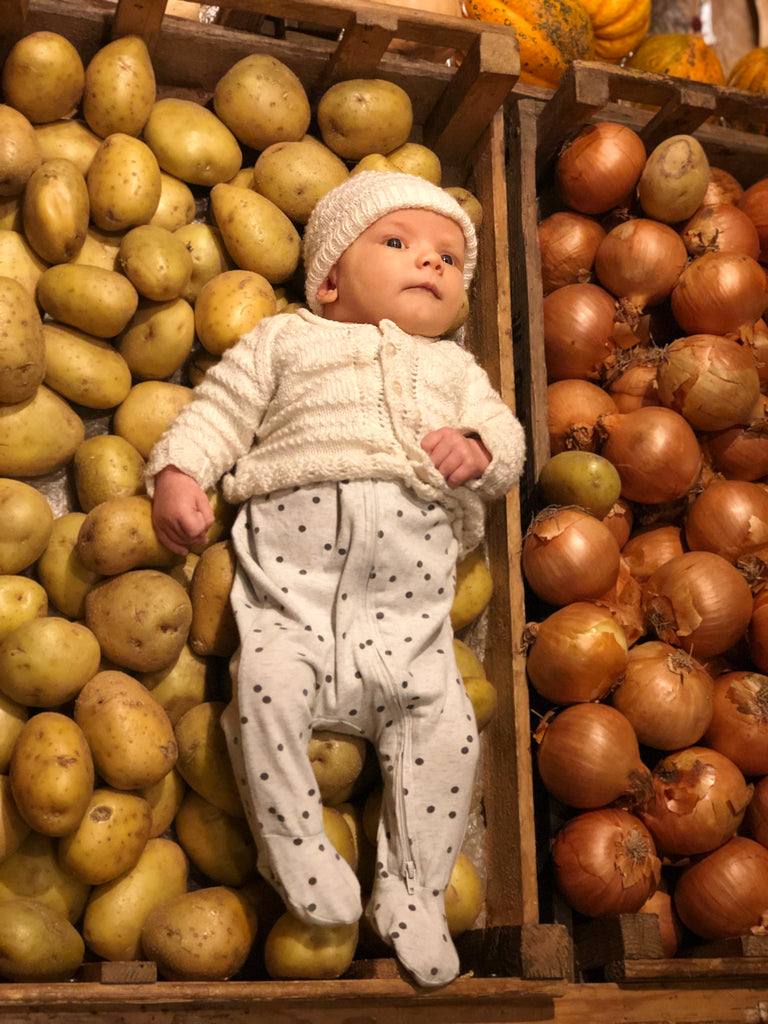
FOODS TO AVOID FOR BREASTFEEDING MUMS
Keep a food diary of what you eat and drink in a day and take note if the nightly episodes are worse after some days. I personally don’t usually consume everything on the below list, but I now know for a fact that when I avoid everything entirely, that’s the night he doesn’t suffer.
- Dairy. Usually the worst offender so eliminate this immediately for at least 6 days and see what happens.
- Other allergy causing foods including eggs, gluten (even oats!), soy and peanuts.
- Mushrooms.
- Corn and beans. Read backs of labels- corn and corn syrup are in SO many foods!
- Cruciferous veggies including brussels sprouts, broccoli, kale (nooooo!) and cabbage (unless fermented as in raw sauerkraut)
- Other “gassy” veggies including onion, garlic, peppers and tomatoes.
- Citrus fruits and drinks. Stay away from OJ!
- Other super ‘juicy and tangy’ fruits including pineapple, strawberries and green kiwi fruits.
- Caffeine including black tea, coffee and chocolate. I could never give up chocolate (sorry Banks!), but I noticed that the darker it is (75%+), the worse it is for him.
- Alcohol. Some studies say that beer won’t cause problems but ALL studies say that any alcohol consumption during breastfeeding must be limited to one glass per day. And if you must drink, begin sipping during a feed and sip slowly. It takes 2 hours for the drink to reach your milk and then starts to ‘wear out’ quickly after, so you should be ok by next feed.
SO WHAT CAN I EAT?
Focus on the abundance of foods you CAN eat and both you and your baby will feel so much more relaxed. It’s also important to note that if your baby is NOT showing any signs of tummy troubles, you’re better off eating all the food groups in moderation. The reason for this is that maternal diet restriction during lactation may increase baby’s chances of developing allergies later in life. -American Academy of Allergy, Asthma, and Immunology.
- Probiotics. I'm usually pretty good with my intake of 'friendly bacteria', but it was when I switched to the kind specifically targeted at infants, children, pregnant women and nursing mothers, when everything changed! I decided to double the dose and literally within 24 hours, Banks was so much more relaxed and my own bowel movements were so much more satisfying :)))
- Avocados.
- Root vegetables especially sweet potatoes, carrots and beetroot.
- Fermented veggies including sauerkraut and gherkins.
- Fruits, but limit those to bananas, pears, papaya, mango and peaches. As a rule of thumb- I like to think of them as ‘creamy’ fruits, meaning that they can be blended into a creamy puree in a blender, but unlike apples they won't be able to go through a juicer to extract liquid.
- Grains and seeds including rice (stick to wild or brown), buckwheat, millet, amaranth and quinoa. Apart from rice, all the rest are actually seeds, which makes them a safe and nutritious base to any meal. Think tabouli, stuffed veggies, porridge, soups, curry and crock pot meals.
- Nuts and seeds. All varieties in moderation are great here unless you suspect an allergy. (Peanut is not a nut and most definitely on the list to avoid!)
- Leafy greens including spinach, rocket, lamb’s lettuce, mustard greens, bok choy and snow pea shoots (but kale fits the cruciferous veg category to avoid for now). Try to eat a variation.
- Sea veggies and kelp noodles.
- Sauces including cashew cream, homemade vegan pesto, nut and seed butters, broths or boullions (always read labels to avoid allergens), hummus, coconut cream/milk, Thai curry, Indian Curry, satay sesame dressing, guacamole, etc.

HOW TO SOOTH CRYING IN A COLICKY BABY
Your baby will be way too upset and too tense from pain, so you’ve gotta be patient and strong here. Remain calm, our little humans feel everything and the last thing they need is the additional nerves from their dearest person. No single remedy will likely work on its own (and what worked yesterday may not work today), so try out as many of the below tips as possible, in any order, as many times as needed.
- Place a warm water bottle on his belly. Make sure it’s not hot.
- Stroke his belly in a clockwise direction. It will be tight, so be extra gentle.
- Stroke his back in a clockwise direction. Lay your baby over your lap or seat him bent forward with one of your hands supporting him around the belly, while rubbing.
- Pedal his legs. Lay him on his back and if he lets you, pedal his legs by bending them at the knees and gently pressing them into his belly to help release gas.
- Try skin-to-skin. Put him on your chest with his ear against your heartbeat and cuddle him until he settles. This reminds him of the sounds and feel of the womb, which may relax him enough for the wind to release more freely.
- Swaddle him. This never worked for mine, as he doesn’t like to feel restricted, but I hear it’s comforting to many babies, so definitely try it.
- Play ‘white noise’. Ask Siri to ‘Play white noise for babies’, download an app or turn on the actual hair dryer or vacuum cleaner. This trick worked wonders on both of mine.
- Back to the breast. Breastmilk contains some natural elements which act as a pain relief for baby and the sucking is soothing too.
- Use a dummy. Don’t know what we would’ve done without! Definitely helps to soothe when they refuse to go back on the breast.
- Create soothing vibrations. Take him out in the car or his pram over cobble stone roads or place his car seat over a clothes dryer (make sure he and the car seat are secure, so neither can fall).
- Walk your baby kangaroo-style. This has always worked for us but requires some patient commitment, so pop him in an ergonomic baby carrier and keep going.
- Rock, roll, bounce, sway or rhythmically and gently move your baby in your arms or a bouncer if you get tired.
- Open windows for fresh air or take the baby outside for a walk - either in a sling or a wedged up pram.
- Try a winding valve. Seems weird but makes a lot of sense if it’s really the gas being trapped in their bellies that’s causing so much agony. The relief will be immediate.
- Try gripe water. It contains Dill Oil, which warms and relaxes the tummy, breaking down trapped air bubbles. Also Sodium Hydrogen Carbonate, which neutralises acid in the baby's tummy. The results are usually a resounding burp.
- Failing that, try Infacol. It contains Simeticone, which is an anti-foaming agent that works locally within the gut and not absorbed into bloodstream. It breaks down the smaller bubbles in the gut, creating larger ones that are easier for baby to pass.
- Failing that, try Colief. It contains the naturally occuring enzyme, lactase, which helps to break down lactose in milk, that some babies have trouble digesting.

HOW TO PREVENT WIND AND COLIC
Since no-one actually knows what colic is, the root cause of it is even harder to establish. However, all of the below methods have worked for both of my children, minimising the fussiness at the very least.
- Eliminate the foods from your diet which I list above under heading 'Foods to avoid for breastfeeding mums'.
- Keep a food and crying diary. Use my guide above to note the worst offenders when it comes to what foods a breastfeeding mama can eat. Observe the bouts of crying intensity within 24 hours of consuming something and consider eliminating it from your diet for a minimum of 6 days, then (only if you must) introduce it back slowly and again observe whether the crying worsens. If your baby is formula-fed, ask the paediatrician about switching to a soy-based (I hope not!), goat milk, pre-digested, or other hypoallergenic formula.
- Keep your baby semi upright. Use wedges (here’s what I bought on Amazon for his hammock bed and pram) so he’s slightly elevated when lying down. If your baby’s already in a cot, place a pile of books under each leg at his head end to elevate the cot. Being in a slightly sloping position as opposed to lying flat, can help a baby eliminate wind and bowel movements slightly easier.
- If breastfeeding, make sure baby is getting lots of “hindmilk” (the creamy harder to extract ending) at each feeding and not just “foremilk” (the watery thirst clinching start). This can happen by making sure one breast is finished before offering the other or only offering one at a feeding and emptying it completely.
- Baby massage. Daily! There are 5 week courses in the UK which are free, so make sure you go, otherwise YouTube videos or follow the below screen shot with instructions.
- Burb your baby after every feed, between feeds and even throughout. Bottle fed babies may take in more air when eating, but in cases like mine, where my milk let-down is too fast, the baby will gulp so quickly, he will take in too much air.
- Probiotics Probiotics Probiotics. These ‘friendly bacteria’ are not just for breastfeeding mothers, as they help restore healthy gut flora in even the newly born babies. It’s hard to imagine that a breastfed child may need his gut flora ‘restored’ and he probably doesn't but my theory is that consuming probiotics (smother over nipples or add to bottle) will leave an alkaline ash in the gut (in other words create a calm environment without acids) and help avoid burning sensation when eliminating acidic poo.
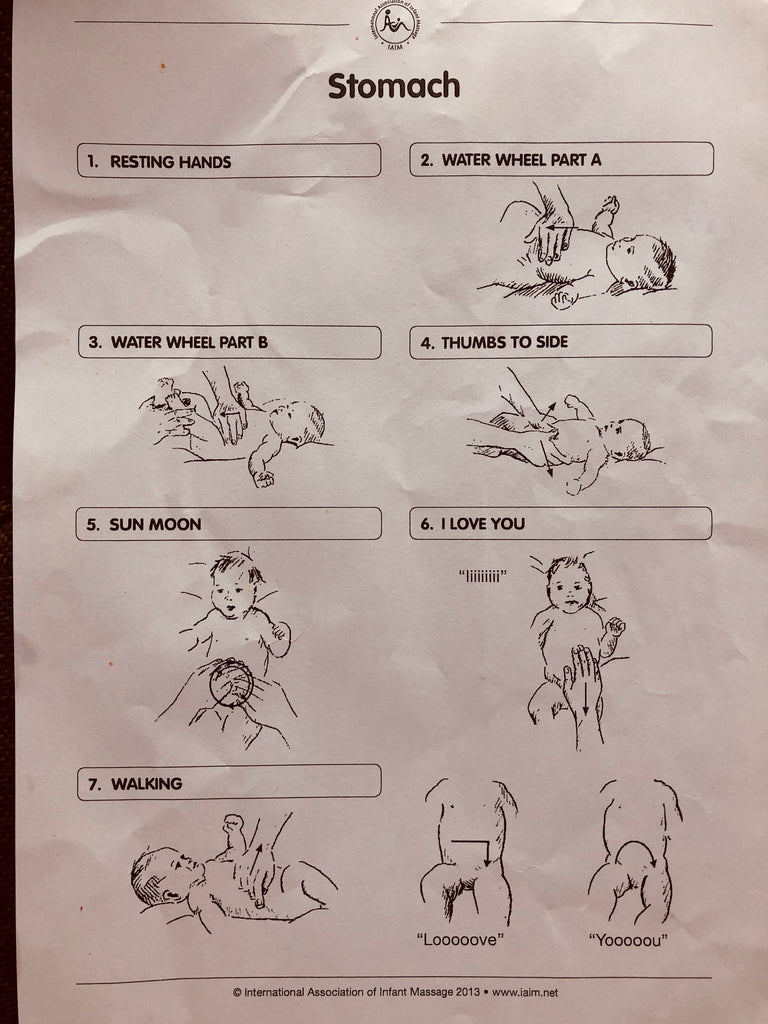
HOW TO NOT LOSE YOUR SH*T
This time is so fricken hard. No parent wants to hear their baby crying inconsolably, but a baby screaming in pure agony can be too much to handle.
- Take comfort in knowing that you’re not alone going through this. Other parents all over the world are trying to comfort their crying child at exactly the same time right now too.
- Always remember- this stage WILL pass.
- Try and remain calm. Babies are super intuitive and can feel your stress, which will only add to theirs.
- What ever you do, do not blame yourself. The crying is not a reflection of your parenting or a test of your character. You are doing the best you can and you’re doing a wonderful job.
- If the crying gets too much and you feel your fuse burning out, put the baby down in a safe place, take a moment for yourself taking deep long breaths in and long sighs out.
- Try to sleep when the baby sleeps, so you are in your right mind and have the energy to deal with the fussiest times of day.
- Cook in advance and freeze a bunch of meals so that you’re not distracted during the difficult evening hours.
- Ask for help. A spouse, a friend, your health visitor or if in the UK, call a helpline from this list. This is not the time to be shy, a parent needs relief from colic as much as the baby.
- Know that you are the best person to comfort your baby. If you can’t do it, nobody can.

Do you have a tip of your own or heard of a method that worked? Please share in the comments below, I'd love love love to hear it and I'm sure that parents going through this painful time would too!
